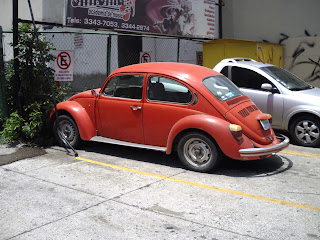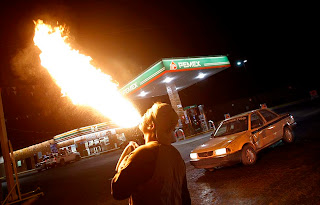In big cities in the United States there is often vocal opposition to those who beg for money. In the northeast cities of Washington DC, New York and Philadelphia, there are places downtown in which you can not walk more than a block without being asked for spare change. Some Americans feel that those who beg should try to find useful work. Whether or not this point of view has merit, these Americans would (or at least should) love the entrepreneureal spirit of the poor in Mexico. While there are far more people who would qualify as the poorest of the poor, almost nobody actually begs in Mexico.
It is true that when you pull up to almost any traffic light along a main boulevard in Guadalajara, you'll find people asking for money. However, the person asking is almost always ready to sell you something, provide some sort of small service or even entertain you in exchange for your generosity.
These services fall along a continuum of usefulness Some are really quite appreciated. On a hot 110 degree Guadalajara day, no sight is more welcome than that of the man selling ice-cold water bottles at a downtown traffic light. Similarly, the harried gentleman on his way to a date might well appreciate the vendor selling red roses at a traffic light along his route. Other products available at your GDL traffic lights include fresh fruit, toys, bubble-makers, candy, lego sets, windshield wipers, car ornaments, roach-killers and just about anything else you can think of.
But there is another class of poor who cannot afford the initial purchases required for these such sales and are really just asking for your compassion. The services they provide may not be particularly useful but their effort is appreciated by many. These men, women and a surprising number of small children are often without decent shoes. Most wear dirty clothing and sometimes are missing teeth or even limbs. However, rather than simply beg, they try to do something to provide at least the semblance of an even exchange. For instance, many will wash your windshield with soapy water and a rag --- a practice that has banned in many American cities, including New York City in 1992 . Others actually do a small performance. One man who works on Avenida Federalismo in Guadalajara dresses as a clown, carries a guitar and will sing a song of your choice. At night, many men, and even a few women, do a fire-breathing performance that looks shockingly dangerous --- at least the first time you see it. In the daytime, there are many jugglers who perform for the first minute of a traffic light cycle and then spend the last 30 seconds heading down the row of cars collecting donations.

Not that all Mexicans give or appreciate the spirit of the traffic light market. There are a many rationalizations for not parting with one's pesos --- some reasonable, others less so. Undoubtedly, some of those asking for money spend it on liquor or drugs. Some traffic light workers collect for organized crime organizations who divert the money toward their own ends. Giving to children can encourage their families to keep them out of school.
These reasons may be valid, however, any good free-market Republican would have to be appreciate the entrepreneurial spirit of those who piece together a living at Mexico's traffic lights. They have found a way to turn major intersections into small free-market economies, making a couple minutes of lost time in a car into a chance to sell, service and entertain.

















































